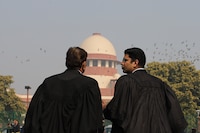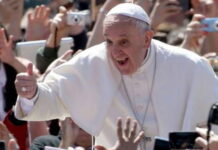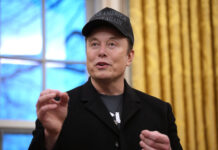
The Supreme Court judges stated that Kirpal’s sexual orientation is not only a matter of pride but his constitutional right. “[He] possesses competence, integrity and intellect. His appointment will add value … and provide inclusion and diversity.”
The government, which is controlled by the Hindu nationalist Bharatiya Janata Party, has not publicly commented on the Supreme Court’s statement, but in the past, senior leaders have made statements against homosexuality.
In India, a group of five senior judges, including the chief justice, selects the candidates for judgeships and refers them to the Justice Ministry for comments. Even if the ministry has objections, the judges can send the candidate’s name back, and the ministry must appoint them.
The ministry, however, has in some cases kept tossing names back, and judges have openly expressed frustration that the government has been holding up some recommendations to scuttle them.
Senior Supreme Court lawyer Menaka Guruswamy, who was one of the lead lawyers in the 2018 case that eventually led to the decriminalization of consensual gay sex, described the rejection of Kirpal as “wrong, unacceptable, and unconstitutional.”
“We expect better from our government,” she said. “LGBT people have always been a part of the social fabric of India.”
The conflict between the two branches of the state is taking place against the backdrop of partial progress for same-sex rights in Indian courtrooms and drawing rooms alike. Since the overturning of the colonial-era law banning gay sex, after a decade-long battle, petitions in court to allow same-sex marriage are expected to be heard by the Supreme Court soon.
Pride parades and Bollywood movies also have contributed to the conversation, and just a week ago, the leader of the Hindu organization that is the ideological parent of the BJP made statements in support of queer people, citing Hindu mythology.
Anand Grover, a Supreme Court lawyer who is working on ongoing same-sex marriage petitions, said that in the early 2000s, he struggled to find petitioners for gay rights cases. “Now, people are barging in saying they want to be the petitioner.”
“Yes, India is changing. Of course, it would be stupid for us to say that society has completely embraced homosexuality,” said Sanjoy Ghosh, another Supreme Court lawyer, “but definitely, we are in a much better place than we were even 10 years ago.”
In light of this progress, Ghosh said he finds it even more “shocking” and “alarming” that the government objects to Kirpal’s appointment.
Kirpal, who has represented petitioners in the case that eventually decriminalized consensual gay sex and is also part of the ongoing same-sex marriage cases, has been awaiting approval for the judgeship for five years.
“The delay is obviously because of my sexuality. It is something that the courts should take up, and do something about it. That’s the reality, and you have to deal with it,” he said to an online outlet last month.
The Supreme Court judges also pushed back against government’s disapproval of other potential candidates, including two who had been rejected for sharing social media posts critical of the government. Another is the son of a judge who submitted a probe into the 2002 riots case from Gujarat that occurred when Prime Minister Narendra Modi was the head of that state.
“Just because you have shared a critical article about the prime minister — that can’t be a reason [to object],” said Grover, the lawyer.
In recent months, the war of words between the BJP-controlled executive and the judiciary has intensified, with senior members of the government openly criticizing the process.
Minister of Law and Justice Kiren Rijiju has called the judicial system “opaque” and “alien,” and Vice President Jagdeep Dhankhar has accused the court of severely compromising the “mandate of the people.”
A 2014 act by the BJP-dominated Parliament tried to expand the ministry’s role in the judge-selection process, but the high court struck it down the next year.








